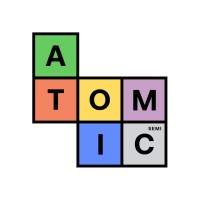Rust Software Engineering Intern - Summer
Atomic Semi.com
110k - 132k USD/year
Office
San Francisco Office
Internship
About Atomic Semi
Atomic Semi is building a small, fast semiconductor fab.
It’s already possible to build this with today’s technology and a few simplifications. We’ll build the tools ourselves so we can quickly iterate and improve.
We’re building a small team of exceptional, hands-on engineers to make this happen. Mechanical, electrical, hardware, computer, and process. We’ll own the stack from atoms to architecture. Our team is optimistic about the future and we want to continue pushing the limits of technology.
Smaller is better. Faster is better. Building it ourselves is better.
We believe our team and lab can build anything. We’ve set up 3D printers, a wide array of microscopes, e-beam writers, general fabrication equipment - and whatever is missing, we’ll just invent along the way.
Atomic was founded by Sam Zeloof and Jim Keller. Sam is best known for making chips in his garage, and Jim has been a leader in the semiconductor industry for the past 40 years.
About The Role
We are seeking a Rust Software Engineering Intern for the Summer term. The internship begins in May or June, with the option for preferably a 4 to 8-month commitment. You will help build the next generation of high-performance tools for chip fabrication and design. These tools blend real-time collaboration, computational geometry, GPU-accelerated visualization, simulation, interactive editing, and data processing.
This is a deeply broad, multi-domain, hands-on role. You’ll work across everything from low-level systems and data synchronization, to high-performance rendering, rich UI/UX editing tools, and distributed infrastructure. The software you build will help engineers design and understand real, physical systems. If you’re excited by performance engineering, building complex features from scratch, and learning new domains quickly, this is a great place to grow.
A portfolio or GitHub is generally required to apply: show us the things you’ve built. For us, a good portfolio includes evidence of strong engineering skills and curiosity.
Responsibilities
- Build deeply interactive editing tools with low-latency, CAD- or Figma-like interfaces for geometry manipulation, routing, annotation, and measurement
- Develop production-grade Rust software targeting both native and WebAssembly environments
- Architect real-time collaborative systems, including state synchronization, conflict resolution, and efficient data transmission
- Implement efficient algorithms for geometry querying, graphs, and routing
- Build high-performance rendering and visualization pipelines from GPU-accelerated rendering and spatial indexing to streaming massive datasets, visualizing millions of polygons, or rendering complex 3D fields
- Continuously profile and optimize CPU, GPU, memory, and network performance to push the limits of responsiveness and scale
- Own major features end-to-end and work closely with internal users, including process engineers and circuit designers, to deliver powerful, intuitive tools that solve real problems
Required Experience
- Pursuing a BS in Computer Science, Computer Engineering, or demonstrated exceptional skill in software engineering
- Strong programming skills in Rust, or significant C++/systems programming experience and a strong desire to learn Rust quickly
- Solid understanding of systems fundamentals: memory, performance, concurrency
- Experience building non-trivial software projects from scratch (personal, academic, or professional)
- Interest in one or more of the following areas: real-time systems, computational geometry, algorithms, GPU programming, visualization
Nice-To-Have
- Experience with interactive software such as Figma, Blender, CAD tools, KiCad, or scientific computing environments
- Background in compiling to WebAssembly or building rich applications
- Familiarity with schema evolution, database migrations, or serialization formats like Protobuf
- Understanding of collaborative or distributed systems (e.g., CRDTs, OT, WebSockets)
- Exposure to geometry or graph algorithms, optimization, or simulation (including spatial data structures and hierarchical representations)
- Experience with GPU programming and rendering technologies (WebGPU, Vulkan, OpenGL)
- Exposure to advanced 2D/3D visualization, simulation, or novel user interfaces
Working at Atomic Semi
We’re an early-stage hardware startup with solid funding, world-class advisors, and a lab/office in San Francisco, CA. Atomic Semi is committed to fair and equitable compensation practices. Software Interns are paid an hourly rate equivalent to an annualized range of $110,000-132,000, depending on experience and education level. This range assumes a 40-hour workweek and includes up to 10 hours of pre-approved weekly overtime, paid at 1.5x the base hourly rate. Actual earnings will vary depending on internship length and hours worked.
Internship Benefits:
- Housing Stipend to help with first month expenses
- Lunches daily, Dinners 3x per week, Stocked Office Kitchen with Snacks and Spindrifts
- Weekly Learning & Development opportunities
- Commuter Benefits including Parking and Late Night Uber rides from the office
- Paid Time Off inclusive of Holidays and Sick Time
Visa Sponsorship
- Medical, Dental, and Vision insurance
401(K) Retirement Plan
- Life and Disability Insurance
We are an equal-opportunity employer and do not discriminate on the basis of race, religion, national origin, gender, sexual orientation, age, veteran status, disability or other legally protected statuses.
Export Control Analysis: This position involves access to technology that is subject to U.S. export controls. Any job offer made will be contingent upon the applicant’s capacity to serve in compliance with U.S. export controls.
Rust Software Engineering Intern - Summer
Office
San Francisco Office
Internship
110k - 132k USD/year
October 7, 2025
